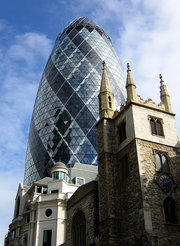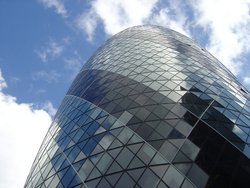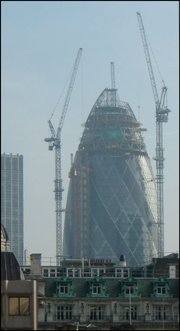30 St Mary Axe
|
|
Swiss.re.arp.750pix.jpg
30 St Mary Axe is a building in the City of London, London, United Kingdom, popularly known as the "Gherkin". It is famous for its daring architecture by Pritzker-prize winner, Norman Foster.
| Contents |
History of the site
The Gherkin building sits on the former site of the the Baltic Exchange building, a famous global marketplace for ships. On 10 April 1992 the Irish Republican Army detonated a bomb close to the Exchange. It all but demolished the historic Exchange building with severe damage to the neighboring structures.
Baltic Exchange found it difficult to rebuild on the site. English Heritage -- a government preservation society -- and the Corporation of London -- another London governing body -- insisted that any redevelopment must restore the building's old facade onto St Mary Axe. The Exchange Hall (http://en.wikipedia.org/wiki/Baltic_Exchange#The_bombing) was a celebrated fixture of the 250-year-old ship-trading company.
Baltic Exchange, unable to afford such an expensive undertaking, sold the land to Trafalgar House in 1995. Most of the remaining structures on the site were then carefully dismantled; the interior of Exchange Hall and the facade were preserved and sealed from the elements.
English Heritage later discovered the damage was far more severe than they had previously thought. So, they stopped insisting on a full restoration -- over the objections of architectural conservationists who favored reconstruction.
Origin of "Gherkin" Nickname
Trafalgar House originally submitted plans for a 1,200 ft (370 m) building with more than 1 million square feet (90,000 m²) of office space, and a 1,000 feet (305 m) tall public viewing platform. The plan was notable for its highly unorthodox floor plan, which resembled a slice of a pickle. The sub-editors at The Guardian newspaper coined the term, gherkin, for the building. Although Trafalgar House abandoned this plan, the nickname has stuck. This unusual building has also been called 'the Erotic Gherkin' (the original Guardian coinage); 'the Crystal Phallus'; and 'the Towering Innuendo'.
The Building
On 23 August, 2000, Deputy Prime Minister John Prescott granted planning permission to construct a much larger building on the site. The new building was completed in 2004 and opened on 28 April. Its architects, Foster and Partners, crafted a distinctive cone-like shape to reduce the wind turbulence around the building. Its unique design won the prestigious RIBA Stirling Prize for the best new building by a RIBA architect in 2004. It was the first time that the prize jury was unanimous in their decision.
The building uses several energy-saving methods which allow it to use half the power a similar tower would consume. Gaps in each floor create six shafts that serve as a natural ventilation system for the entire building. The shafts create a giant double glazing effect -- wherein air is sandwiched between two layers of glazing and acts as insulation for the interior. Double glazing in residential houses is limited in thickness to avoid the inefficient convection of heat, but the Swiss Re tower actually exploits this effect. The shafts pull warm air out of the building during the summer, and they warm the building in the winter using passive solar heating. The shafts also allow sunlight to pass through the building, making the work environment more pleasing, and keeping the lighting costs down.
Despite its overall curved glass shape, there is only one piece of curved glass on the building -- a lens-shaped cap at the very top (http://www.30stmaryaxe.com/photo.asp?imgSec=1).
The primary occupant of the building is Swiss Re re-insurers, who gave the building its other popular name, the Swiss Re Tower.
Recent problems
On 25 April 2005, the press reported that a glass panel two-thirds up the 590 ft tower had fallen to the plaza beneath on 18 April. The plaza was sealed off, but the building remains open. A temporary covered walkway, extending across the plaza to the building's reception, was erected to protect visitors. Engineers have begun examining the other 744 glass panels on the building.
See also
References
- Campaign to save the old Baltic Exchange (http://www.savebritainsheritage.org/baltic.htm), before the start of construction.
External links
- Official homepage (http://www.30stmaryaxe.com/)
- Quick Facts (http://www.30stmaryaxe.com/fact.asp)
- Interior Pictures (http://www.30stmaryaxe.com/photo.asp?imgSec=3)
- Exterior Pictures (http://www.30stmaryaxe.com/photo.asp?imgSec=2)
- Norman Foster's official site about the project (http://www.fosterandpartners.com/InternetSite/html/Project.asp?JobNo=1004#) - Contains fascinating Quicktime movies.
- Structurae: 30 Saint Mary Axe (http://en.structurae.de/structures/data/index.cfm?ID=s0005369)
- Skyscrapernews.com file on 30 St Mary's Axe (http://www.skyscrapernews.com/buildings.php?id=58)
- This is London news story - "Safety fear over Gherkin" (http://www.thisislondon.co.uk/news/londonnews/articles/18148925?source=Evening%20Standard)de:30 St Mary Axe



